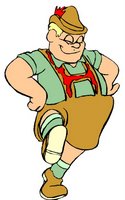Then there’s Hans in Luck. By this time, Hans is 25 years old, and is so fat that he is unable to leave his kitchen. After saving the village from becoming populated entirely with suspiciously canine-looking children at the age of 9, the grateful village elders pledged a lifetime supply of strudel for Hans, and while his mind is still as keen as ever, his size prevents him from being able to move around. He is unable to wear clothes, and he cannot wash himself. One day, the old, blind woman who comes to scrub Hans with a massive brush every three months, finds a discarded raisin in one of his stomach creases, and offers it to him for a feed. Lucky Hans!
The very next tale, is Hans Married. Now as I mentioned, despite his size, Hans is still very clever, and from his days of studying the habits of the Nasty Wolf in order to foil his evil scheme, he picked-up a thing or two about how to treat a lady. So rather than scoff the prodigal raisin when offered to him, Hans instead gives it to the old, blind woman, who eats it and immediately turns into a stunning, sexy maiden who instantly falls in love with Hans, not for his looks, but for his brain (hard to believe, I know, but this IS a fairy tale). Hans gets married.
The next story about Hans describes his wedding night. There is a typing error in the title, though. It’s called Hans the Hedgehog.
While one might have thought the next story, Iron Hans, was also about his wedding night, it does in fact describe his heart-wrenching struggle to lose weight. Under the instruction of his enchanted, and eternally beautiful wife, fresh as she is from the catwalks of Milan, Hans learns how to discreetly excuse himself after every meal and to retreat to the bathroom where he inserts his fingers into his throat and vomits it all up. Before long, Hans is as fit as a fiddle, and opens up the world’s first franchise for pressing creases into freshly-laundered lederhosen. He calls the franchise, ‘Iron Hans’.
In Strong Hans, the final chapter in the G-Brothers’ epic, our hero is much older, and very, very wealthy thanks both to the success of the business, and the odd omission on his annual tax declaration. Hans was forced to learn very quickly how nasty it can get in the business world, particularly for a tall poppy like him! It seemed to Hans that every young businessman in town had a snout for trouble, sharp teeth and a grieving complex for the Daddy that was deprived them at birth. They were out to get Hans, and he had to make a choice; get tough, or perish. Strong Hans became the Berg’s baddest mob-leader, at least on the outside. His cronies terrorised the young, wolfish wannabes, demanding protection money and offering no room for forgiveness on late payments. Strong Hans was feared by all who frequented the taverns and bawdy-houses near the wharves, but every night, in the arms of his beloved, he cried like a baby at the deeds he was forced to perform and for the childhood innocence that was deprived him by the scandalous conduct of the Nasty Wolf, all those decades ago.
And just like the archetypal tavern brawler, or the undefeated gun-slinger of the Old West (or the New West, as it would have been then … well really, it would have been the Future West), Hans was forever being challenged or threatened from the shadows by every young punk who could wield a sabre and who dreamed of making a name for himself as the ‘One who brought down Strong Hans’.
It was on the night that Strong Hans learned of his enchanted wife’s decades of infidelity that one of these young no-hopers finally got his break. Hans, drunk, disillusioned and weeping insanely didn’t stand a chance as he was attacked from behind and took a dagger beneath his ribs. Strong Hans spent his last seconds lying in a grizzly mess on the cold flagstones, mouthing an inaudible “thank you” to his young assailant.
So you see, Dear Reader, that The Brothers Grimm’s message is very clear. Nothing good ever comes from standing out. Hans should have kept that big, fat, sparsely hirsute, over-developed scone of his out of the Nasty Wolf’s business right from the beginning. He should have listened to the villagers when they told him he was fat, useless and that he should lock himself away in the dark broom cupboard. Yes, the message is oh-so clear. If you do not wish to lead a retched life, you must remain mediocre! Do not be smart, pretty, famous or witty. Be plain, retiring and avoid success of any kind. In short, do not shine! Latch that bushel down very tightly. Only then will you lead a long, unambiguous and uncomplicated life.
 Picture: Google images
Picture: Google images
1 comment:
Ah, mediocrity. One cannot sing its praises too loudly. If only more people in my country were mediocre rather than stupid, or fabulously stupie...or even exceptionally so, the world would be a safer place. And cleaner.
Hans. One wonders if the Grimm brothers would have been happier working apart from one another.
Post a Comment